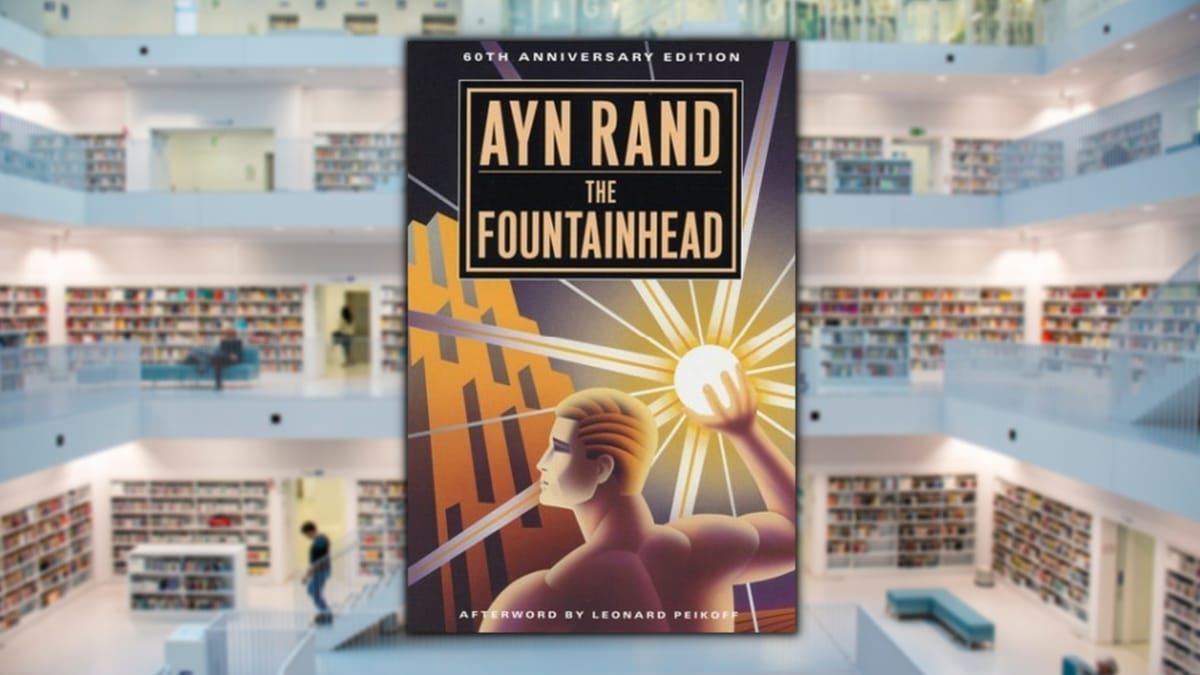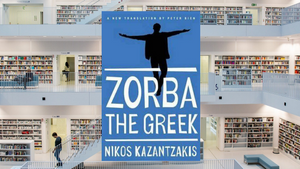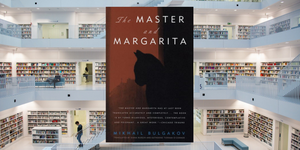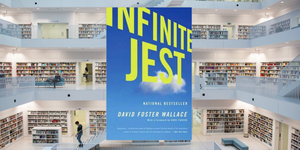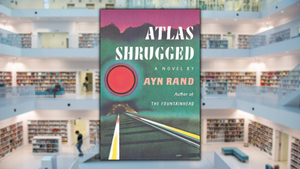
This Book is For:
*People who refuse to compromise on their own standards just for the sake of fitting in, and who would rather stand alone than live like everyone else.
*Anyone with a vision for how they want their lives to unfold, and who want to read about an exceptionally inspiring (fictional) example of someone who took their vision to the ultimate extreme, no matter what the opposition.
*Individualists who feel a deep antipathy to the kind of "herd conformity" pushed on everyone by society today, and who want to develop the tools and language to resist it and fight back.
*Everyone who feels as though there must be more to life than what's commonly offered by the examples of those around them, but perhaps doesn't quite know how many options they truly have, or that they can develop the strength of will to head down a better, alternate path.
Summary:
"I like to see a man standing at the foot of a skyscraper. It's man who made it - the whole incredible mass of stone and steel. It doesn't dwarf him, it makes him greater than the structure. It reveals his true dimensions to the world. What we love about these buildings, Dominique, is the creative faculty, the heroic in man."
-Ayn Rand, The Fountainhead
There aren't many writers who inspire such strong feelings in readers - either of fierce admiration or antipathy - as Ayn Rand does. Architects, libertarians, business owners, and individualists love her to death, and plenty of people find her philosophy absolutely abhorrent, but one thing she will not be is ignored.
However, if you feel as though there is something special in human beings, some potential, some higher purpose to our existence than simply going along to get along - some higher value than mere safety and conformity - The Fountainhead is likely to speak to you as well.
You might find, as I did, that you still can't fully endorse all of her ideas or sympathize completely with her worldview, but this book has stayed with me from virtually the very moment I started reading it, and it has profoundly shaped my life ever since.
The novel's protagonist, Howard Roark, is Rand's conception of an "ideal man," an architect (in every sense of that word) who refuses to compromise on the clear vision he maintains in his mind concerning his life, his work, and his values, which, for him, ultimately amount to the same thing.
It's the story of a supremely strong-willed "Self" being fully what he is, and his struggle against the collectivism of his contemporaries: a category of "soft-willed" people that Ayn Rand refers to as "second-handers."
The book has sold more than 9,000,000 copies since its initial publication and while it's not a "perfect" book by any means, its portrayal of the strong individual against the fearful collective, "the struggle for integrity of Roark's creative work against every form of social opposition," and the need for an unshakeable vision by which to orient one's life makes it an absolutely transformative book for the right person at the right time.
Maybe the "right time" to read The Fountainhead is when you're young, when you still believe that you can take on the world and win, before you allow the natural (but not inevitable) calcification of old age to set in and you lose your will to fight. That is to say, you should read this book before it's too late.
Okay, so you've just read seven whole paragraphs about why The Fountainhead is so amazing. Now, what is it actually about?
Howard Roark, the main character (in every sense of that term) is an architect who, at the beginning of the novel, is expelled from the Stanton Institute of Technology because he refuses to conform to that school's stylistic preferences and historical ideas about what architecture should be and look like.
After taking a job at a struggling firm in New York City shortly thereafter, he has to watch as a talentless conformist, Peter Keating, soars to the top of a rival architectural firm through a combination of pandering to popular demand and downright treachery behind the scenes. It doesn't stop Keating from coming to Roark to ask for help with design problems, though - assistance which Roark provides freely.
All this while a socialist architecture critic, Ellsworth Toohey, uses his power and influence to attempt to destroy Roark's career; a tabloid publisher Gail Wynand befriends and then later betrays Roark when public opinion shifts against them; and Dominique Francon, Roark's "love interest" in the novel, who, while sympathetic to Roark's ideas, alternates between helping him and undermining his work at every turn.
All these characters are representative of several of Rand's ideas, although basically every other character in the book is a cardboard cutout of Rand's conceptions of "good" and "evil." The bad characters are all bad, the good characters are all good, with nothing in between. Even the major characters, while more fully realized, are essentially just there to advance Rand's philosophy. Which isn't necessarily a bad thing, but in her hands, it makes for kind of a clunky book.
The Fountainhead is still hugely important for several reasons, one of which is its re-imagining of the very idea of selfishness, even though I don't think Rand herself makes a very good case for it.
She does reject the commonsense view that selfishness necessarily involves harming and exploiting others, in favor of a kind of "live and let live" philosophy that I can generally support. However, she goes too far where she rejects even the idea of altruism(!!), making some convoluted argument that helping others is somehow evil. It doesn't make a whole lot of sense, I have to say. But we'll get into all that below in the Key Ideas section of this breakdown.
I will, however, draw attention to the fact that Rand rightfully illustrates in her book that the pursuit of power is really just a different form of dependence. In order to have and maintain power, there need to be other people whom you have power over. But someone who is master of themselves has no interest in being a master over others. Thus, her philosophy of "selfishness" rejects the idea that power over others is a worthwhile life goal, and I tend to agree.
There is one final, ultimate message of Objectivism, Rand's personal philosophy, that most people could (and probably should) accept, which affirms the importance of a central, productive purpose in an individual's life. Something they live for: something that defines their existence, epitomizes their values, and forms the basic architecture of their being.
For Howard Roark, this was designing beautiful skyscrapers. For me, it's sharing the transformative power of books and reading (and health and fitness). For you, it will probably be something different.
Above all, however, if we can state that your "ego" is really just the summation of all your beliefs, values, drives, and creativity, then Rand may be right in saying that the ego is the fountainhead of all human progress.

Key Ideas:
#1: Your Work is the Meaning of Your Life
"By what conceivable right can anyone demand that a human being exist for anything but for his own joy? Your work, the material the earth offers you, and what you make of it, is the meaning of life."
This is one of Ayn Rand's most enduring ideas, and it goes a long way toward explaining much of the alienation from the fruits of their own productive work that's felt by workers everywhere today.
We've been separated from the creative work that represents the meaning of our lives, and instead forced into drudgery - building the dreams of others for eight hours a day, instead of doing the kind of work that really brings us to life.
Now, Rand being an unabashed capitalist, perhaps it's not overly surprising that her philosophy seems to presuppose the existence of "higher" and "lower" natures; the existence of people mostly only capable of building the dreams of others on the one hand, and those like Howard Roark on the other, who are capable of taking charge of their own destinies.
My interpretation of her idea that "work is the meaning of your life" is kinder and more optimistic, in that I don't necessarily believe in some creative caste system, where only a few "masters" are capable of finding their joy in creative work, and the rest of the "slaves" who are only suitable for mindless drudgery. I find the idea abhorrent, and I believe that there's room in this world for many more "Howard Roarks" than Ayn Rand could ever imagine.
It's just that most people either haven't caught on yet, or are, by necessity, engaged in "subsistence" work: paying bills, paying off debt, and trying to survive, without yet having access to the luxury of "existing for their own joy."
I'm optimistic, though, because the world is getting richer all the time, and because work can be one of the biggest sources of an individual's creative joy and fulfillment. I know that if we keep working hard to raise the quality of life of everyone on Earth, then a far greater percentage of people are going to realize the truth of this statement before too long.
This is not a new idea, and just seven years after The Fountainhead came out, David Riesman wrote in The Lonely Crowd that work can represent an opportunity for the individual to express their highest potentialities.
There's nothing intrinsic to the idea of working for a living that states that it has to be anything like slavery. Riesman wrote that book way back in the fifties, and so there's no way he could have predicted the rise of AI, but drudgery is fast becoming a thing of the past.
Work can be the organizing principle of your life! It can give your days meaning, structure, and vibrancy, and there's something horribly...dehumanizing about the idea that work has to be all "suffering and futility." It doesn't have to be. Howard Roarks exist. There are people like him, people who exist for their own joy, who contribute to the greater good those things that only they can contribute, and in the future, that same path is going to be laid wide open for a larger number of people than ever before in human history.
When work becomes the meaning of your life, it doesn't mean that you do nothing but work - it simply means that work becomes less instrumental, not so much a means of simple survival, but a source of joy and meaning that doesn't necessarily have to exist for any other purpose besides your own fulfillment. And the simple fact that Ayn Rand was even capable of imagining such a future makes some of her books worth reading.
Finally, however, and even though I've been deeply impacted by Rand's philosophy, I will always, categorically resist her idea that there's some sort of "hierarchy" of work, that there exist "higher" and "lower" individuals in this world. Indeed, in this I side with the great Martin Luther King, who said:
“If a man is called to be a street sweeper, he should sweep streets even as a Michelangelo painted, or Beethoven composed music or Shakespeare wrote poetry. He should sweep streets so well that all the hosts of heaven and earth will pause to say, 'Here lived a great street sweeper who did his job well.'”
#2: The Greatest Kind of Courage
“Katie, why do they always teach us that it's easy and evil to do what we want and that we need discipline to restrain ourselves? It's the hardest thing in the world - to do what we want. And it takes the greatest kind of courage.
I mean, what we really want. As I wanted to marry you. Not as I want to sleep with some woman or get drunk or get my name in the papers. Those things - they're not even desires - they're things people do to escape from desires - because it's such a big responsibility, really to want something."
This right here is one of those passages that made my entire reading of The Fountainhead worth it, and you're luckier than most people are if you end up giving this idea more consideration when you're younger. You know, before it's too late.
People tend to think that wanting things is so easy. You just somehow (and for whatever reason) have a desire; you decide that it's something, well, desirable, and then you go after it. But why do we want what we want? Are our desires our own, or were they planted there by others? And are they even worthwhile things to want in the first place?
The very beginning of the process of building and having a Self is to know what you want, why you want it, and what you're willing to do (and not willing to do) to get it. And yet how many people ever really know the answers to these questions? Or even question their automatic desires in the first place? How many people are basing the entire structure of their desires on what other people told them to want?
How many Peter Keatings are there out in the world?
What you actually, truly want out of life is one of the first things to figure out. It's the main thing. It can't be rushed, it can't be "given" to you, and it can't be unconscious. What's so mesmerizing about a Howard Roark character is that people like that know what they want, and why they want it; they know that their desires springs from the deepest part of themselves, and that it takes immense courage - the greatest courage - to stay true to that ultimate vision no matter what.
That's what shook me up so hard when I read The Fountainhead. I realized that I was being subtly influenced by all these people, basically strangers trying to tell me what I should want, and that what they wanted would automatically be good for me too.
Thankfully, I was young and strong enough to resist, and never fully bought into any of their ideas in the first place. If I hadn't had the presence of mind to resist, my life would resemble the tragic consequence of this staggering quote by Carl Jung:
"The world will ask you who you are. And if you don't know, the world will tell you."
Sure, you can accept suggestions from the world about who you are, try different things - experiment. But always, always question. Never, ever just blindly "accept." Find out what you want - what you really want - before the world decides for you and just tells you what to want. Blindly accepting the world's idea of who you are is living death.
I simply couldn't imagine not knowing what I want out of life. Not only that, I'm positively ecstatic with gratitude that I was armed with books like The Fountainhead when the world came around and tried to tell me what to want and how to live.
My only advice to you (and it's only advice, because in this case I represent "the world," so you should question everything I say) is that you spend as much time and expend as much effort as necessary in order to find out what you truly want out of life more than anything else.
Never allow anyone else to rush you into a potentially disastrous decision. Take your time. Develop your courage to resist. The world doesn't know who you are until you tell the world who you are. And it's completely up to you:
“If you want my advice, Peter, you’ve made a mistake already. By asking me. By asking anyone. Never ask people. Not about your work. Don’t you know what you want? How can you stand it, not to know?”
#3: The Unsacrificed Self
“Should we not, then, stop preaching dangerous and vicious nonsense? Self-sacrifice? But it is precisely the self that cannot and must not be sacrificed. It is the unsacrificed self that we must respect in man above all.”
Academic philosophy is justly ridiculed for wasting a ton of time arguing over the meaning of words and the possibilities of language (snore), but here's one instance where it does actually matter. And it matters a lot, because this is your Self that we're talking about here.
We also have to separate and salvage concern for others from what Rand is trying to do philosophically. You can give yourself to others - take an active, benevolent interest in their well-being and flourishing - without sacrificing yourself for them, which is the part she actually gets right.
At the same time, however, I just have to roll my eyes when she starts talking about the "virtues of selfishness" and such nonsense. It gives people the wrong idea, as it's so often conflated with greed and avarice.
There's a lot to unpack - and certainly more than I can get to in this short piece - but I'm going to argue two things here: that most people are using the word "self-sacrifice" in the wrong way and Ayn Rand is using "selfishness" in the wrong way.
First, selfishness. For this word, we have the definitions "excessive interest in oneself," and "at the expense of or in disregard of others." Neither of these are good! Regardless of the desirability of personal freedom and self-expression.
I'm sorry, but we exist in the midst of other Selves, and their well-being is intimately connected with our own. We don't live completely for others, sure, but they still deserve a prominent place in our moral calculus, if for no other reason than that living in a world where everyone is flourishing is more likely to contribute to our own happiness and satisfaction at the same time. We are all connected.
Yet, she's absolutely correct about self-sacrifice. The Self - who You are - must never, ever, EVER be sacrificed for any reason. As you can tell, I feel somewhat strongly about this!
This goes back to what we discussed in the previous Key Idea. How can one ever, EVER allow the world to dictate how You express your own individuality or live out your creative purpose? Decide how much of your Self you're allowed to keep? By what right?!
Look, there's nothing greedy about the character of Howard Roark, but he's one of the most self-ish individuals in world literature. Clearly, I think he makes an error in discounting the profound impact that the well-being of others can make on your own happiness and well-being, but one thing he absolutely gets right is that he will never submit to sacrificing what is most true about his life and existence because of the pressure from some faceless crowd that won't ever be able to fathom the full value of what he'd be giving up.
Ayn Rand's point is that the "second-handers" in her book give themselves up completely to others, and thus have no personal identity or ego at all. Forget about the size (or shape, dimensions, however we measure the ego), but you need to have an ego of some description. You need some definitely formed substance, some invulnerable Self that clearly articulates to the world who you are, what you want, what you stand for, what you will tolerate, and what you will not.
In the name of being "unselfish," the second-handers erroneously give up one of the most important things in the entire universe - precisely what cannot, must not, ever be sacrificed. But in light of what we've discussed previously, it's relatively easy to see why some people (most people) give themselves away so cheaply or never bother to develop a Self in the first place.
It's hard! It is, without question, one of the most difficult things a human being is ever called upon to do (create themselves). It's the work of a lifetime, and to finally, truly and honestly, figure out who You are and what You want is a legitimate accomplishment:
“That’s the sort of thing I want you to understand. To sell your soul is the easiest thing in the world. That's what everybody does every hour of his life. If I asked you to keep your soul - would you understand why that's much harder?"
#4: A Philosophical Mic Drop
"Mr. Roark, we're alone here. Why don't you tell me what you think of me? In any words you wish. No one will hear us."
"But I don't think of you."
I almost didn't include this as a "Key Idea" from The Fountainhead, but it's one of my favorite exchanges in all of fiction, and I wanted to make sure it didn't get lost in the Book Notes below. But it's also an example of Rand's philosophy in action.
Howard Roark is displaying utter egotism right here. In my view, he's not specifically condemning Ellsworth Toohey (the other character in this particular conversation), but rather displaying a total, undiluted focus on who he is himself and where he intends to go.
He's not thinking of anyone - Toohey, the rest of the "second-handers," or anybody else for that matter; he's thinking solely of his own ultimate purpose and vision, and he's moving forthrightly in that direction. Everything else, to him, is just noise.
"But I don't think of you." What a powerful rebuff. A total repudiation of Toohey's claim on his focus or attention, on his life. In more words, it's as if Roark is saying, "You are free to live as you please, and I will not interfere. I respect your freedom and your right to your aloneness, and I simply ask the same."
#5: Slaves and Masters
"It stands to reason that where there's sacrifice, there's someone collecting sacrificial offerings. Where there's service, there's someone being served. The man who speaks to you of sacrifice, speaks of slaves and masters. And intends to be the master.
But if you ever hear a man telling you that you must be happy, that it's your natural right, that your first duty is to yourself - that will be the man who's not after your soul. That will be the man who has nothing to gain from you."
If you want to know what other people are likely to do in any given situation, follow the incentives. How are they structured? What behaviors are encouraged by the specific incentives on offer?
For example, in a company, if honest mistakes are punished and it's the people who never seem to make a wrong move who are more likely to get ahead, that culture - the incentives that culture encourages - is going to lead to an entire company full of people who never take risks, never admit to wrongdoing or errors in judgment, and who will hide the truth until it's too late.
Such a company is not likely to survive, and perhaps no one inside that company wants to work for such a company, but because of the incentive structure, that's exactly the kind of company everyone winds up with.
Ayn Rand's philosophy of independence is fundamentally a philosophy of freedom, both for you and for everyone with whom you share this earth. She's saying, in effect, "Live for yourself and be happy. I don't want anything from you. I have no intention of being either a master or a slave."
The incentive structure this philosophy sets up can be highly positive. Adherents would have no interest in becoming a master over anyone else, or any incentive to engage in the kind of cruelty such a master-slave system lends itself to. Everyone is free, and they certainly have no interest in being a slave either.
#6: The Greatness of Man
"When I look at the ocean, I feel the greatness of man. I think of man's magnificent capacity that created this ship to conquer all that senseless space. When I look at mountain peaks, I think of tunnels and dynamite. When I look at the planets, I think of airplanes."
You know you're a nerd when you have a favorite astrophysicist. Anyway, mine is Neil DeGrasse Tyson, and I recall him saying something a few years ago that has never left me. This isn't an exact quote, but he said something like:
"Most people look up at the infinity of stars in the sky and it makes them feel extremely small. But when I look up at the night sky, I feel big."
Similarly, it's so easy to look up at these massive skyscrapers we have, or consider all these unbelievable achievements that surround us every day and think that it somehow diminishes you, or that you're so small compared to the great masterpieces of world literature and art, the futuristic technological advances that support our lives, etc., when that couldn't be further from the truth.
Same thing with the natural world of which we're all a part. You are intimately connected with all of it, and the same humanity that was responsible for those airplanes and skyscrapers and artistic masterpieces flows through you.
When I think of humanity, I don't think about evil or smallness; I think about genome sequences and the internet, space stations, self-driving cars, symphonies, and cathedrals! We're responsible for all of it, and when I think of everything positive that humanity has done, I'm inspired by what we are still capable of and what we will do.
Mine is a much more optimistic vision of humanity than Ayn Rand's - indeed, she doesn't think too highly of all those "second-handers," and it's clear she that she thought that most people fell into that category - but it's no less real than hers. I am, to borrow a phrase from the novelist Ursula K. Le Guin, simply a realist of a larger reality.
I will never for an instant deny that humanity as a whole leaves a lot to be desired. There's "room for improvement," to put it very mildly. But let me talk to you about racecar drivers for a second.
When racecar drivers see that they're about to crash into a wall, they never look at the wall; they look away from the wall, because that helps steer them towards where they want to go. If they looked at the wall - where they didn't want to go - it's more likely that they'd unconsciously steer themselves in that direction. The same goes for all of us. Even for humanity collectively.
If you look for the negative in life, you're sure to find it. It's almost literally everywhere. But so is the good. And if you're looking for that, you're sure to find it too. So a long time ago, around the time I read The Fountainhead, I made a conscious decision to look away from the wall and towards human greatness. I chose to turn away from weakness, cruelty, and greed, and instead turned in the direction of the best of what human beings are capable of doing and becoming. And I've never looked back.

Book Notes:
“My dear fellow, who will let you?”
“That’s not the point. The point is, who will stop me?”
“Why is it so important what others have done? Why does it become sacred by the mere fact of not being your own? Why is anyone and everyone right - so long as it’s not yourself? Why does the number of those others take the place of truth?”
“But you see, I have, let’s say, sixty years to live. Most of that time will be spent working. I’ve chosen the work I want to do. If I find no joy in it, then I’m only condemning myself to sixty years of torture. And I can find the joy only if I do my work in the best way possible to me. But the best is a matter of standards—and I set my own standards. I inherit nothing. I stand at the end of no tradition. I may, perhaps, stand at the beginning of one.”
“How do you always manage to decide?”
“How can you let others decide for you?”
“But do you know how many days there are in thirty years?”
"We must accept and forgive - there is so much to be forgiven in each one of us."
“All the witnesses have told the truth. But not the whole truth. I am merely filling in the omissions. They spoke of a threat and of hatred. They were right. The Stoddard Temple is a threat to many things. If it were allowed to exist, nobody would dare to look at himself in the mirror. And that is a cruel thing to do to men.
Ask anything of men. Ask them to achieve wealth, fame, love, brutality, murder, self-sacrifice. But don't ask them to achieve self-respect. They will hate your soul.
They won't say, of course, that they hate you. They will say that you hate them. It's near enough, I suppose. They know the emotion involved. Such are men as they are.
So what is the use of being a martyr to the impossible? What is the use of building for a world that does not exist?
Let us destroy, but don't let us pretend that we are committing an act of virtue. Let us say that we are moles and we object to mountain peaks."
“You’ll win, because you’ve chosen the hardest way of fighting for your freedom from the world.”
“The Palmers bore you and the Eddingtons snub you. But you have to flatter people whom you despise in order to impress other people who despise you.”
"I often think that he's the only one of us who's achieved immortality.
I don't mean in the sense of fame and I don't mean that he won't die someday. But he's living it. I think he is what the conception really means.
You know how people long to be eternal. But they die with every day that passes. When you meet them, they're not what you met last. In any given hour, they kill some part of themselves. They change, they deny, they contradict - and they call it growth.
At the end there's nothing left, nothing unreversed or unbetrayed; as if there had never been any entity, only a succession of adjectives fading in and out on an unformed mass. How do they expect a permanence that they have never held for a single moment?
But Howard - one can imagine him existing forever."
"Architecture is music in stone."
“He had never seen the boy before and he would never see him again. He did not know that he had given someone the courage to face a lifetime.”
“What is it, Gail?”
“Nothing. Only a feeling of how much is unimportant and how easy it is to live.”
“I don’t think a man can hurt another, not in any important way. Neither hurt him nor help him.”
“Why, no. I'm too conceited. If you want to call it that. I don't make comparisons. I never think of myself in relation to anyone else. I just refuse to measure myself as part of anything. I'm an utter egotist."
“I’ve looked at him - at what's left of him - and it's helped me to understand.
He's paying the price and wondering for what sin and telling himself that he's been too selfish. In what act or thought of his has there ever been a self? What was his aim in life?
Greatness - in other people's eyes. Fame, admiration, envy - all that which comes from others. Others dictated his convictions, which he did not hold, but he was satisfied that others believed he held them. Others were his motive power and his prime concern.
He didn't want to be great, but to be thought great. He didn't want to build, but to be admired as a builder. He borrowed from others in order to make an impression on others.
There's your actual selflessness. It's his ego that he's betrayed and given up. But everybody calls him selfish."
"What is at the root of every despicable action? Not selfishness, but precisely the absence of a self."
"Look at everyone around us. You've wondered why they suffer, why they seek happiness and never find it. If any man stopped and asked himself whether he's ever held a truly personal desire, he'd find the answer. He'd see that all his wishes, his efforts, his dreams, his ambitions are motivated by other men.
He's not really struggling even for material wealth, but for the second-hander's delusion - prestige. A stamp of approval, not his own. He can find no joy in the struggle and no joy when he has succeeded. He can't say about a single thing: 'This is what I wanted because I wanted it, not because it made my neighbors gape at me.' Then he wonders why he's unhappy."
“We haven’t even got a word for the quality I mean - for the self-sufficiency of man’s spirit.”
“Just listen to any prophet and if you hear him speak of sacrifice - run.”
"Men have a weapon against you. Reason. So you must be very sure to take it away from them. Cut the props from under them. But be careful.
Don't deny outright. Never deny anything outright, you give your hand away. Don't say reason is evil - though some have gone that far and with astonishing success. Just say that reason is limited. That there's something above it.
What? You don't have to be too clear about it either. The field's inexhaustible. 'Instinct' - 'Feeling' - 'Revelation' - 'Divine Intuition' - 'Dialectic Materialism'.
If you get caught at some crucial point and somebody tells you that your doctrine doesn't make sense - you're ready for him. You tell him that there's something above sense. That here he must not try to think, he must feel. He must believe.
Suspend reason and you play it deuces wild. Anything goes in any manner you wish whenever you need it. You've got him. Can you rule a thinking man? We don't want any thinking men."
“They say sound never dies, but travels on in space - what happens to a man’s heartbeats?”
"If physical slavery is repulsive, how much more repulsive is the concept of servility of the spirit?"
“I came here to say that I do not recognize anyone's right to one minute of my life. Nor to any part of my energy. Nor to any achievement of mine. No matter who makes the claim, how large their number or how great their need."
“I wished to come here and state my terms. I do not care to exist on any others.”
“I recognize no obligations toward men except one: to respect their freedom and to take no part in a slave society.”

Important Insights from Related Books:
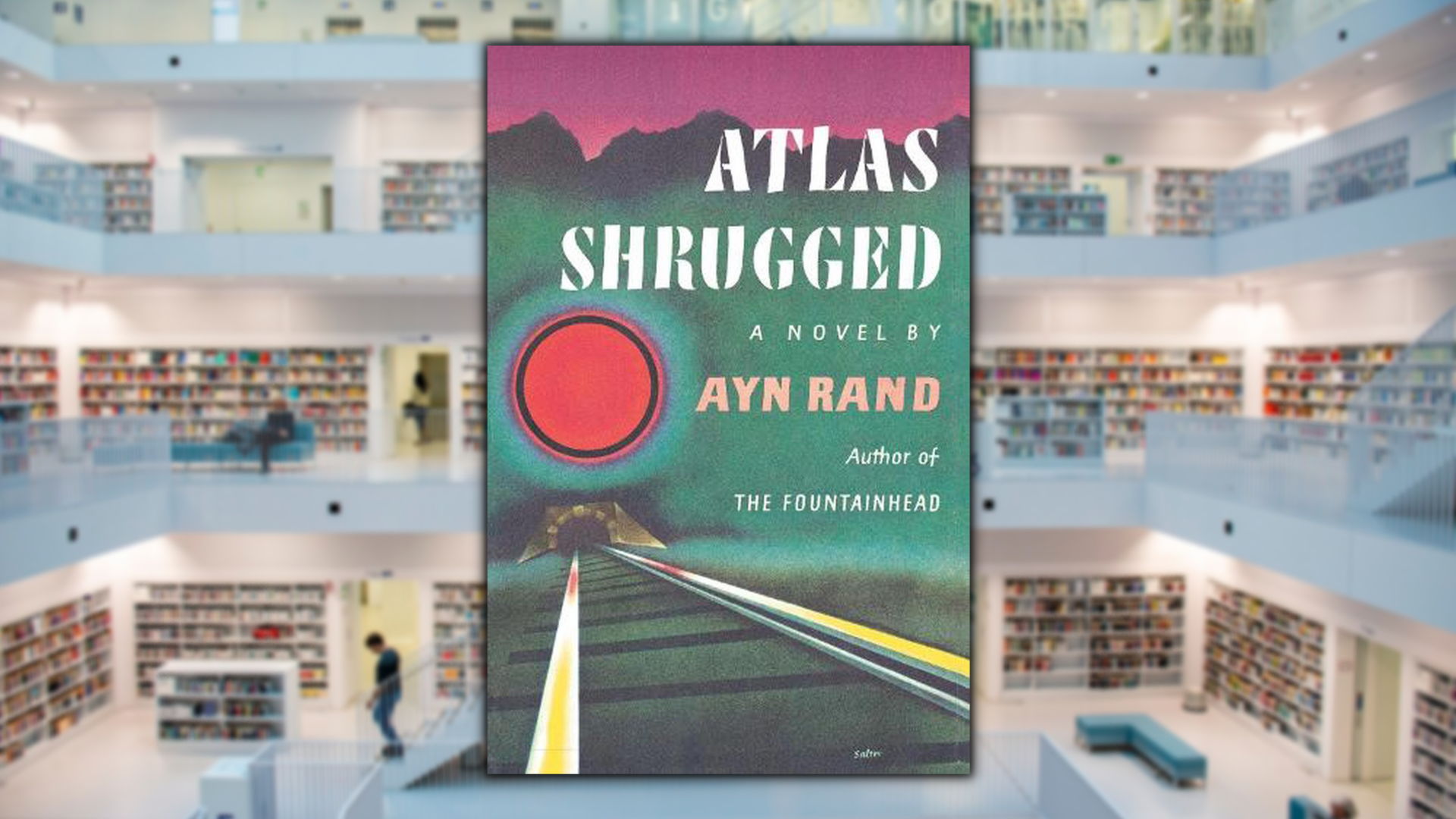
Atlas Shrugged, by Ayn Rand:
Saying that you “love Ayn Rand” is a lot like saying, “I believe in God.” The listener has to follow up with “What do you mean by that?” When you tell someone you love Ayn Rand, they’re going to need a little bit more information. I find many of her views absolutely abhorrent, yet I can state unequivocally that she changed my life for the better.
See, Atlas Shrugged can be read in many different ways, which is probably one of the reasons why it’s still so popular today.
In some circles, it’s seen as the philosophical justification for the motto “greed is good,” which, I don’t think I have to tell you, is not something that I particularly gravitate towards.
That being said, I do share Rand’s opinion that charting your own path, maintaining an irrepressible vision for how you want your one and only life to look, and sacrificing anything and everything necessary in order to achieve it is vital to a life well-lived. Most of the people who are really alive in this world have an inspiring vision pulling them forward and infusing every moment of their lives with meaning and depth.
In Atlas Shrugged, we have Dagny Taggart, a railroad executive who takes over her father’s company because the rest of the men in charge are so incompetent and lazy that they would run the railroad into the ground if Dagny let them. Which she won’t, because she’s a proverbial force of nature. Rand made her into an exceptionally strong female lead who is constantly questioned by the men in the novel, constantly objected to and interfered with, and yet she manages to lift her own burden and drive progress forward.
One of Dagny’s steel suppliers, Hank Reardon (another "good guy" in the novel), ends up developing a new kind of steel that revolutionizes the entire industry, and they get to work bringing this grand vision of connecting the entire country with this massive railroad system to life.
All this goes fine until the mysterious figure of John Galt starts persuading all of Rand’s “good guys” to quit the railroad business and literally disappear.
This sets the stage for a total collapse of industry in America, with the government handing out benefits to people who have never provided any real value (the worst crime imaginable in Rand’s view), and the freeloading employees of companies all over the country letting everything fall into disrepair - all of which leads to rioting, death, and a direct threat to the lives of Dagny and Hank.
Atlas Shrugged gets dark in the middle, and it’s genuinely riveting. Like I said, her writing leaves something to be desired (for example, all her characters are either good or evil, with nothing in between), and the whole book’s purpose is to serve a political point, but I couldn’t stop reading.
It’s about so much more than just railroads and capitalism. It’s about happiness as the goal and purpose of a human life, and how hard work toward a compelling vision makes a person happy.
It’s about taking responsibility; being a hero to yourself and others; creating value where none existed before, and thinking for yourself in a world where everyone wants you to think just like they do.
The book has faults, and I’m not setting up Ayn Rand as some sort of unimpeachable role model. But Atlas Shrugged teaches that creation - making something that didn’t exist before - and not apologizing for your own existence are fundamental components of human flourishing.
Sample Quotes from the Book:
“My philosophy, in essence, is the concept of man as a heroic being, with his own happiness as the moral purpose of his life, with productive achievement as his noblest activity, and reason as his only absolute.”
“The only pride of her workday was not that it had been lived, but that it had been survived. It was wrong, she thought, it was viciously wrong that one should ever be forced to say that about any hour of one's life."
"No one's happiness but my own is in my power to achieve or destroy."
Read the Full Breakdown: Atlas Shrugged, by Ayn Rand
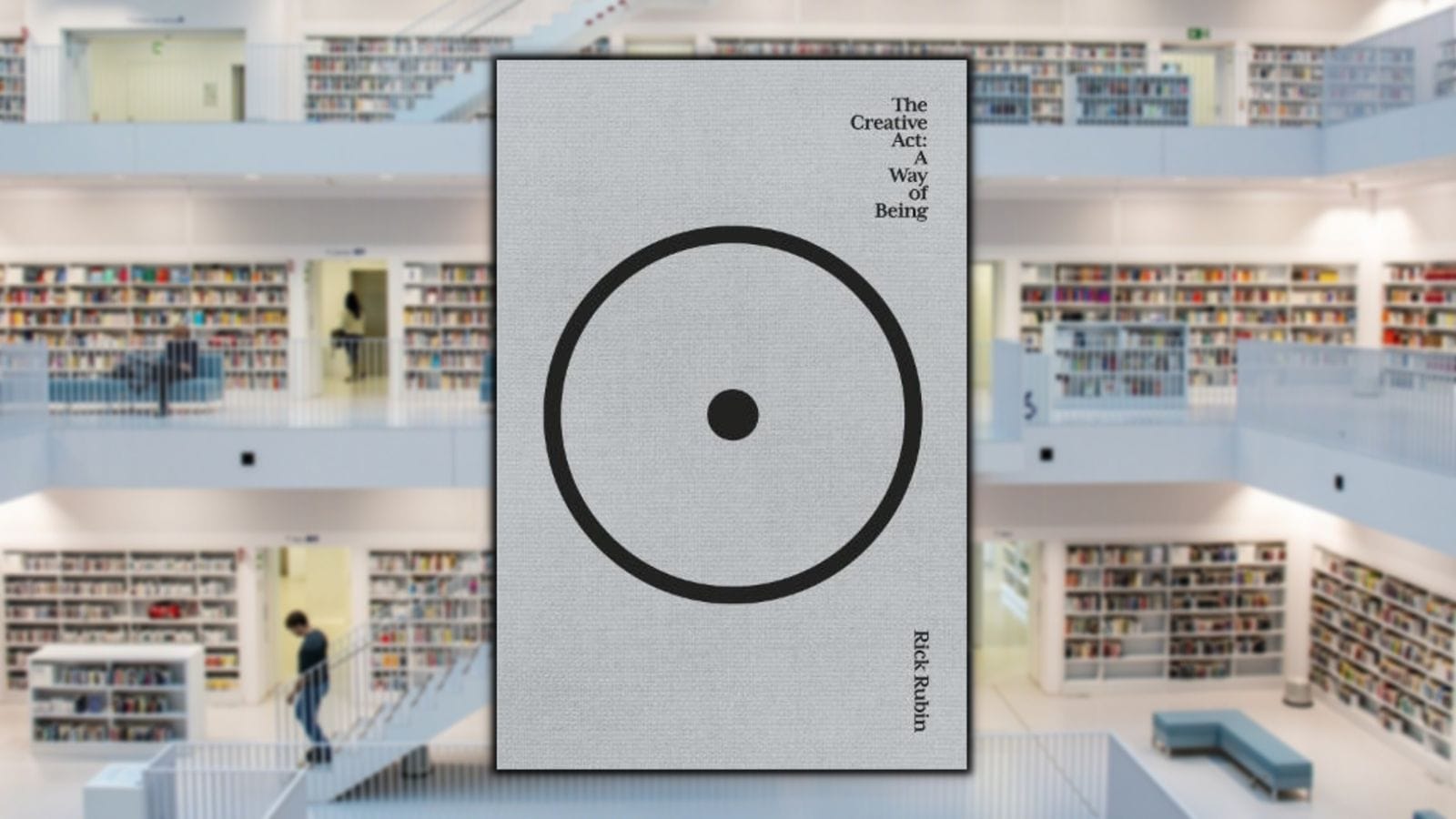
The Creative Act, by Rick Rubin:
Legendary music producer Rick Rubin has probably guided more of your favorite songs into existence than you realize, no matter whether you listen to country, rock, rap, metal, or anything in between.
Ever since co-founding Def Jam Recordings from his college dormitory in the 1980s, he's produced albums for Slayer, Adele, Jay-Z, Neil Young, Johnnie Cash, and a huge number of other artists that have very little in common other than the fact that they all record songs.
As Rubin says in the book, "However you frame yourself as an artist, the frame is too small,” which idea he definitely exemplifies in his own life and creative work. Even The Creative Act itself expanded beyond its frame, because, as he said about his own writing process:
“I set out to write a book about what to do to make a great work of art. Instead, it revealed itself to be a book on how to be.”
The above statement is a big key to understanding the book, to Rubin's creative process in general, and to the nature of life and art itself, because he reveals that living and being are inseparable from the work you end up creating. There is no "work-life balance" for the true artist, and everyone is an artist if only they would learn to see.
Being an artist isn't so much about what kind of art you make, or some particular volume of output, but rather it's about your relationship to the world and how much of it you can pick up through your senses. And how much of what you see you're able to pass on to your audience to help us see it too.
The Creative Act contains 78 philosophical "musings" on the nature of art and the laws of creativity, although most of those "laws" are more or less made to be broken. Really, the only law that Rubin says is "less breakable" than the others is the need for patience.
Tactically, inside you'll find a wealth of insights about finding - and being receptive to - ideas, settling on sustainable rituals that will help you achieve longevity in your career, advice about setting limits, advice about exceeding limits, how to discover your own unique voice, and even what it means to express oneself creatively.
In the Key Ideas section, we'll be discussing what it might be like to pay attention as though you were landing a plane, how to expand the universe, how to anger the audience and incite strong reactions to your work, and more.
Rick Rubin will help us understand why we must become finishers, how we can take our work to its extreme conclusion, and why expressing ourselves is the best - and perhaps only - way to discover who we really are.
The fundamental idea behind much of his advice is that we are all artists, and each of us has something meaningful to contribute to the world, whether we're actively working to make it real or not. That's part of the magic that he often brought to the studio, and that's part of the magic he put into this book.
Sample Quotes from the Book:
“The ability to look deeply is the root of creativity. To see past the ordinary and the mundane and get to what might otherwise be invisible."
“We can quiet our inside so we can perceive more on the outside, or quiet the outside so we can notice more of what's happening inside. We can zoom in on something so closely it loses the features that make it what it appears to be, or zoom so far out it seems like something entirely new.
The universe is only as large as our perception of it. When we cultivate our awareness, we are expanding the universe. This expands the scope, not just of the material at our disposal to create from, but of the life we get to live."
“Rules direct us to average behaviors. If we're aiming to create works that are exceptional, most rules don't apply. Average is nothing to aspire to. The goal is not to fit in. If anything, it's to amplify the differences, what doesn't fit, the special characteristics unique to how you see the world."
Read the Full Breakdown: The Creative Act, by Rick Rubin
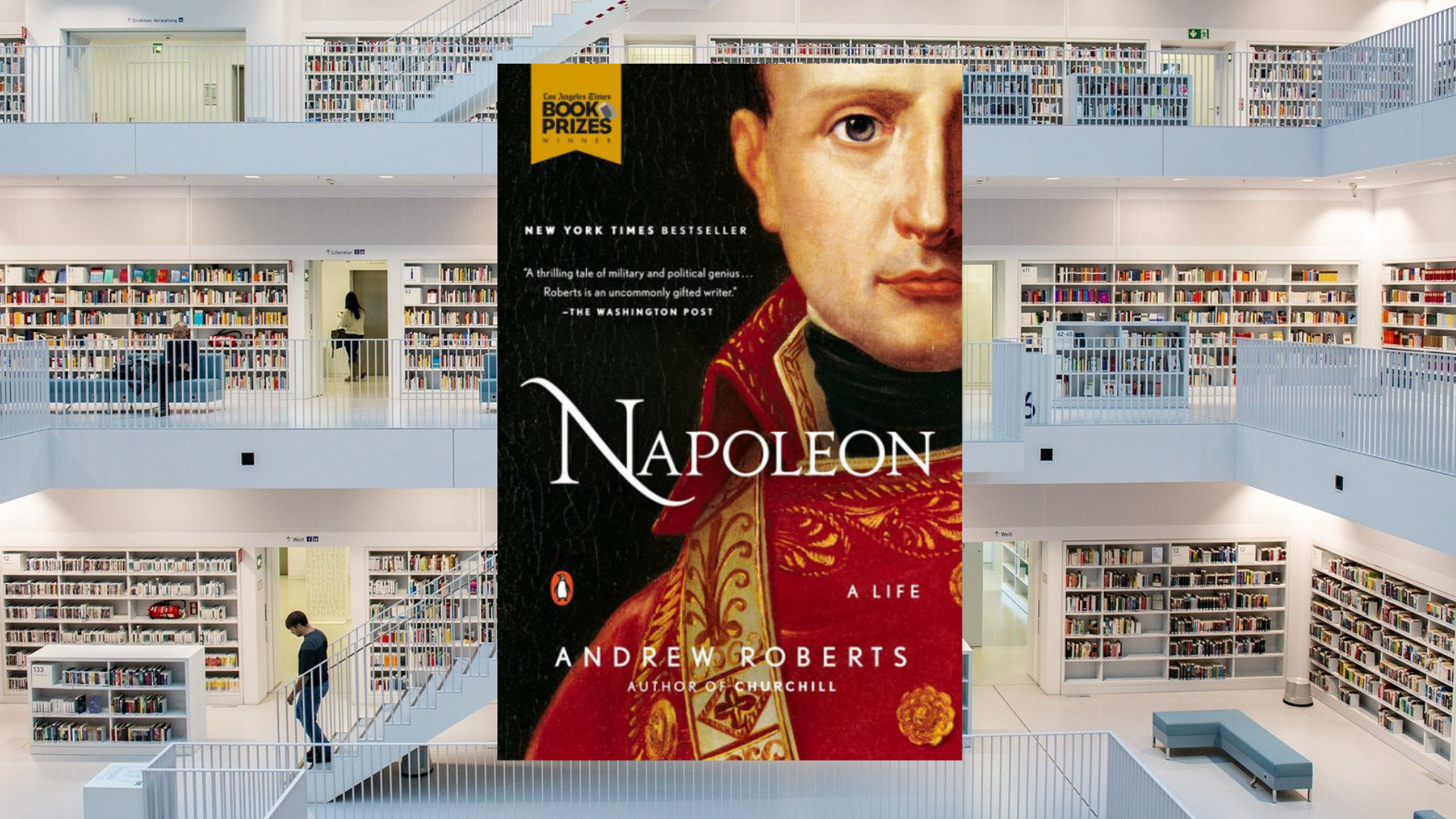
Napoleon: A Life, by Andrew Roberts:
It’s difficult to imagine how someone so active, so energetic, so alive could now be so still. There have been more books written with the word "Napoleon" in the title than there have been days since his death in 1821, but in a very real, visceral sense, this book brought him back to life, at least in my imagination.
It's more than a biography - it's a complete reimagining of Napoleon's adventures, impact, and legacy. In this, the shortest 800-page book I've ever read, I found myself repeatedly swept up in the larger-than-life majesty of Napoleon's life and campaigns, and I've pulled out some invaluable lessons that we can all apply to live bigger and better.
Even just the massive scale and scope of Napoleon's campaigns, his sweeping vision, and yes, his humanity...they all come together via Roberts' masterful storytelling to make this one of the greatest books I've ever read.
It’s actually astonishing how many of the institutions and laws and reforms that exist today come directly from him. Meritocracy, equality before the law, property rights, religious toleration, modern secular education and so much more were ushered in during Napoleon’s reign, and he championed all of them.
For example:
“By 1813 French secondary schools were the best in Europe and some of Napoleon’s original lycées, such as Condorcet, Charlemagne, Louis-le-Grand, and Henri IV, are still among the best schools in France two centuries later.”
Napoleon wasn't a role model in every sense, but he was a creator, a builder; a deep thinker, and a thoughtful intellectual with a massive influence in the public sphere for literally centuries after his death. He is, in large part, responsible for the creation of the modern world - "the Enlightenment on horseback" - and we could do a lot worse than extracting the vital lessons from his life, keeping what is useful, discarding what is abhorrent, and making our lives the monument that his was.
Sample Quotes from the Book:
“They seek to destroy the Revolution by attacking my person. I will defend it, for I am the Revolution.”
-Napoleon, after the failure of the royalist assassination plot of 1804
“He convinced his followers they were taking part in an adventure, a pageant, an experiment, and a story whose sheer splendor would draw the attention of posterity for centuries.
He was able to impart to ordinary people the sense that their lives – and, if necessary, their deaths in battle – mattered in the context of great events. They too could make history.
It is untrue that he cared nothing for his men and was careless with their lives. He lost a friend in almost every major battle, and his letters to Josephine and Marie Louise make it clear that these deaths, and those of his soldiers, affected him.
Yet he could not allow that to deflect him from his main purpose of pursuing victory, and he would not have been able to function as a general if it had, any more than Ulysses Grant or George Patton could have done.
Napoleon certainly never lacked confidence in his own capacity as a military leader. On St Helena, when asked why he had not taken Frederick the Great’s sword when he had visited Sans Souci, he replied, ‘Because I had my own.’”
“We are here to guide public opinion, not to discuss it.”
Read the Full Breakdown: Napoleon: A Life, by Andrew Roberts
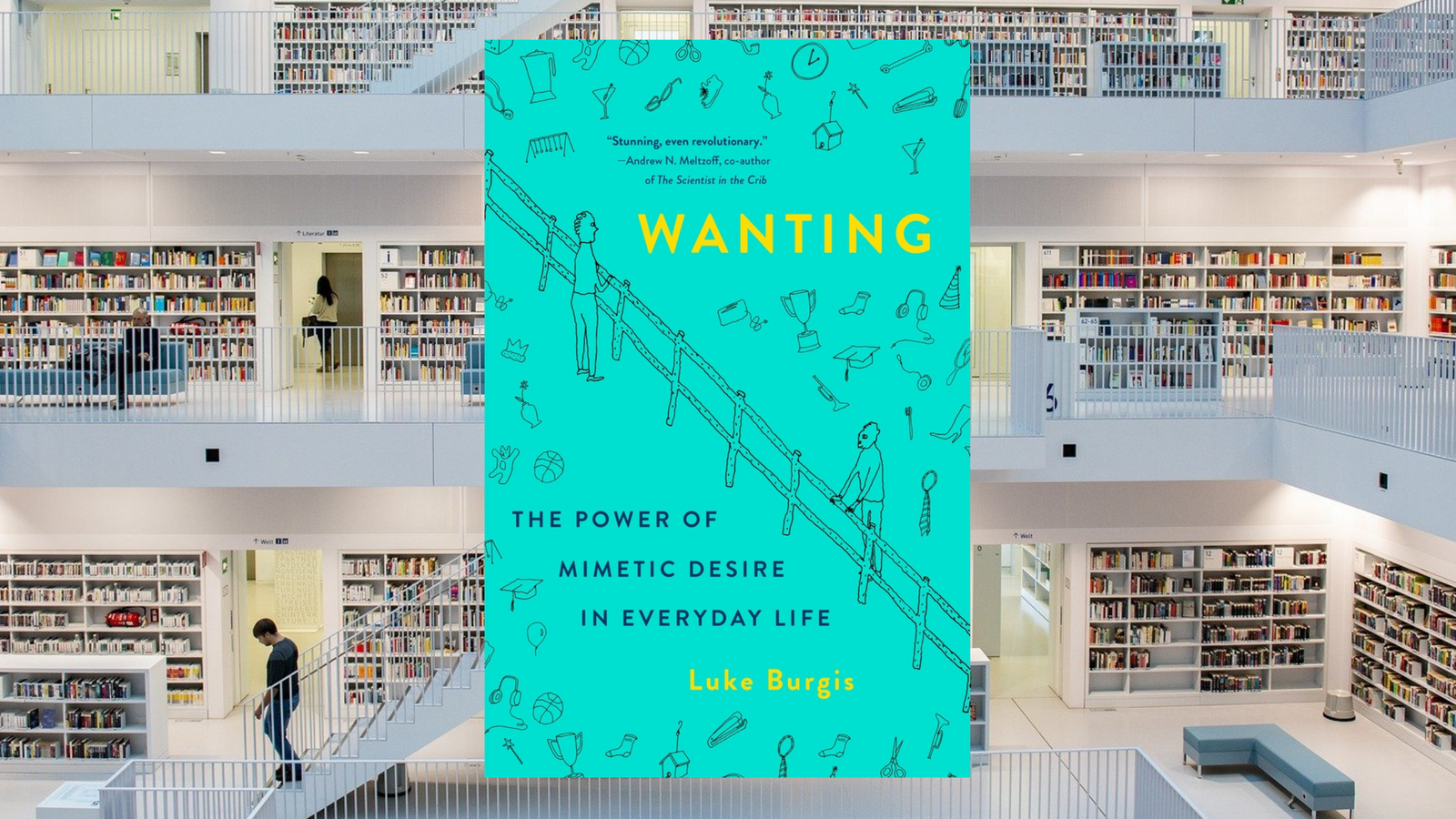
Wanting, by Luke Burgis:
It's surprising how little that people know about where their desires actually come from. It's not obvious why we want what we want, and it's the endlessly fascinating "universe of human desire" that is the subject of this book.
Backed up by the hugely influential French intellectual René Girard, author Luke Burgis shows that humans rarely desire anything independently. Human desire is mimetic - we imitate what other people want.
But in the exact same way that gravity exerts an invisible force on our bodies, the psychological force of mimesis shapes human desire all the time, silently and invisibly, and hardly anyone is aware of it happening at all.
Wanting is about how we arrive at our desires, and about how we can transform our relationship with those desires in order to step into our full humanity, relate to each other more harmoniously, and intelligently select our desires in such a way that we enlarge ourselves, rather than diminish ourselves.
Sample Quotes from the Book:
“Each of us spends every moment of our life, from the moment we’re born to the moment we die, wanting something. We even want in our sleep. Yet few people ever take the time to understand how they come to want things in the first place. Wanting well, like thinking clearly, is not an ability we’re born with. It’s a freedom we have to earn.”
“The imitation of desire has to do with our profound openness to other people’s interior lives – something that sets us apart as humans. Desire, as Girard used the word, does not mean the drive for food or sex or shelter or security. Those things are better called needs – they’re hardwired into our bodies.
Biological needs don’t rely on imitation. If I’m dying of thirst in the desert, I don’t need anyone to show me that water is desirable. But after meeting our basic needs as creatures, we enter into the human universe of desire. And knowing what to want is much harder than knowing what to need.”
“We are generally fascinated with people who have a different relationship to desire, real or perceived. When people don’t seem to care what other people want or don’t want the same things, they seem otherworldly. They appear less affected by mimesis – anti-mimetic, even. And that’s fascinating, because most of us aren’t.”
Read the Full Breakdown: Wanting, by Luke Burgis
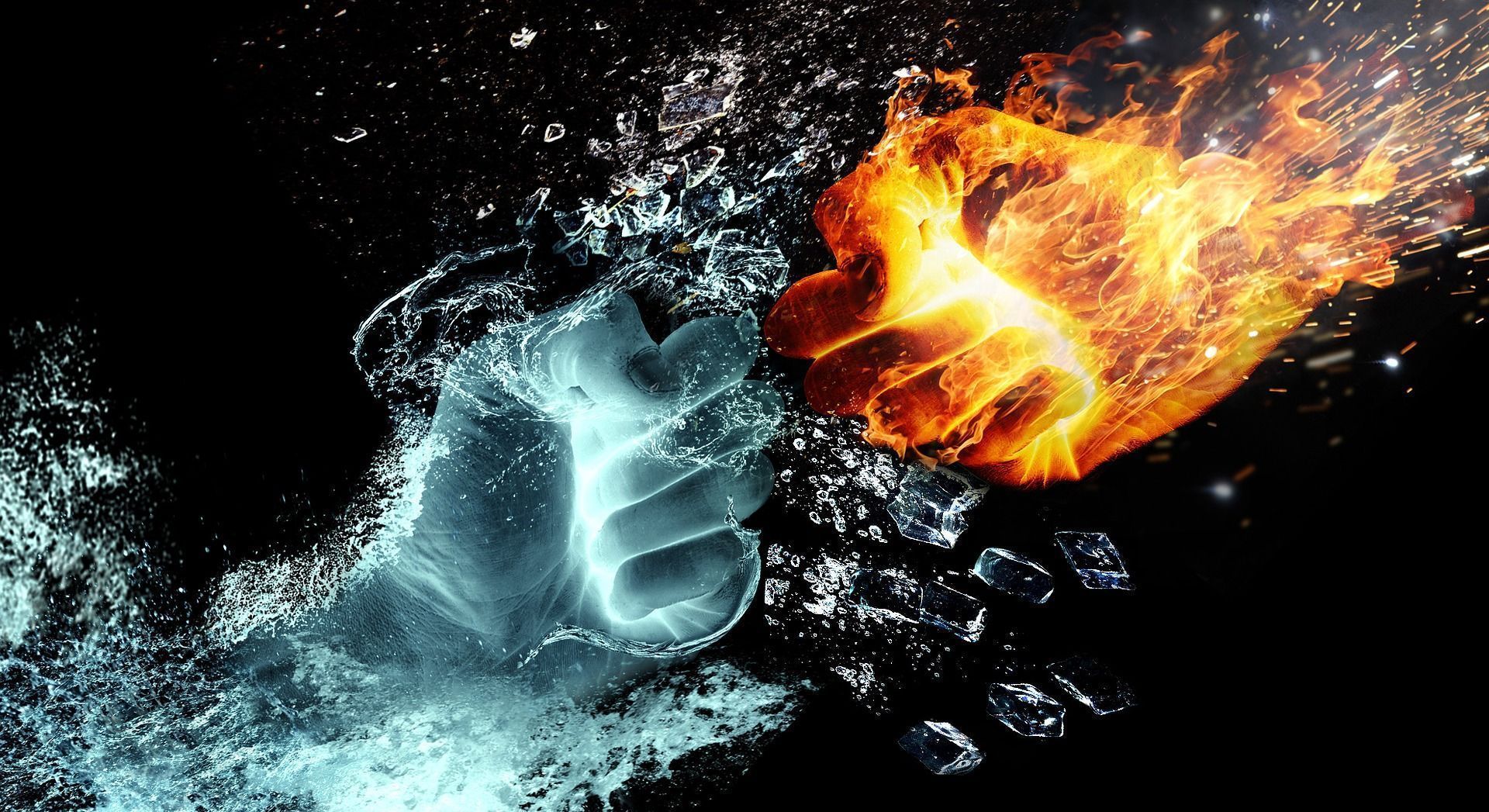
The View from the Opposition:
No one's ideas are beyond questioning. In this section, I argue the case for the opposition and raise some points you might wish to evaluate for yourself while reading this book.
#1: Bad Writer, Worse Person
This should be fun! Okay. So first off...you could cut about 300 pages from both The Fountainhead and Atlas Shrugged and probably end up with two much better books. And you can pretty much do away with We the Living altogether.
The books are long, the dialogue tastes of cardboard, the characters are black and white, etc., etc. These are all criticisms that have been directed toward Ayn Rand's books in the past (not without merit), apart from the philosophical hate she gets from encouraging people to behave like selfish jerks.
That being said, English was also her second language, and some of the best parts of those books are delivered with such staggering force that I wouldn't want to be on the receiving end of her first!
Sure, the 50-page soliloquys would never, ever, literally ever happen in real life - you'd have to imagine an entire room full of people stopping everything they're doing for an entire quarter of an hour just for the sheer pleasure of listening to Hank Reardon drone on about the wonders of capitalism. But for all that, Rand's books are still absolutely worth reading. They're simply amazing, and as lame as it sounds, they changed my life forever.
So she wasn't the greatest writer, even though she certainly had flashes of brilliance (many of them), and I audibly groaned at several points while reading We the Living, but on a personal level, she doesn't sound like someone most of us would care to know either.
For one thing, many of her detractors love to point out that despite railing against social security and Medicare and all sorts of similar governmental support programs, she ended up applying for them herself later in life.
On the one hand, it's like sure, she was entitled to them, even if she thought they were evil, and so she's just taking advantage of a system designed to benefit people like her. By taking advantage of those benefits, she was just acting in her own self interests, which is totally in line with her philosophy. That being said, even if it's not necessarily "hypocrisy" - and some people would definitely say that it is - at the very least it's a contradiction, which she said didn't exist.
One more parting cheap shot: Laughably, The Ayn Rand Institute is registered as a nonprofit organization!
#2: What's Up with That Senseless Rape Scene?
And then there's some super weird rape scene that just appears randomly and doesn't make any sense? Yeah. I know, it's...not great.
It's probably made worse by the fact that she can't write, but in her "defense" I guess(?), she denied that what happened in the novel was actually rape. From Wikipedia: "Rand's posthumously published working notes for the novel indicate that when she started on the book in 1936, she conceived of Roark's character that 'were it necessary, he could rape her and feel justified.'"
Yeah. The less said about that part of the book the better.
"The test of a first-rate intelligence is the ability to hold two opposed ideas in the mind at the same time and still retain the ability to function.”
-F. Scott Fitzgerald

Questions to Stimulate Your Thinking:
The quality of your questions determines the quality of your life. That's also how you get the absolute most out of any book that you decide to read:
You ask great questions the whole time - as though the book was on trial for its life.
Here in this section are a few questions that can help guide and stimulate your thinking, but try to come up with your own additional questions, especially if you decide to read this book the whole way through...
#1: "Have you ever found anyone who knew more about how you should live your own life than you did? How would that even be possible?"
#2: "Have you found a productive purpose for your life yet, or are you still looking? Where are you looking? Do you feel as though you're getting closer?"
#3: "Can a 'productive purpose for one's life' include something other than a career or a vocation? What might that look like? Can that become your purpose?"
#4: "What's the best motive or purpose that an individual can live for? How did you arrive at that answer?"
#5: "Why is it so difficult to chart your own course in life without being sidetracked and thrown off course by the demands and expectations of others?"
#6: "When was the last time you were tempted to conform to the expectations of others or sacrifice your own Self, but found the courage to resist? Do you think you could do it again? Have you done it again?"
#7: "Can you really be free as long as you are a master over others?"
#8: "Is selfishness compatible with being a good person and leading a good life? Does a kind of virtuous selfishness exist? In what form?"
#9: "What's so wrong about altruism? Is it as evil as Ayn Rand says that it is? What could lead her to believe such a thing about human beings?"
#10: "When you look at some of the greatest achievements of humanity, do you feel small and insignificant? Or do you feel big, and as though the same creative, ambitious spirit flows through you as well?"
"Judge a man by his questions, rather than by his answers."
-Voltaire

Action Steps:
So you've finished reading. What do you do now?
Reading for pleasure is great, and I wholeheartedly support it. However, I am intensely practical when I'm reading for a particular purpose. I want a result. I want to take what I've learned and apply it to my one and only life to make it better!
Because that's really what the Great Books all say. They all say: "You must change your life!" So here, below, are some suggestions for how you can apply the wisdom found in this breakdown to improve your actual life.
Please commit to taking massive action on this immediately! Acting on what you've learned here today will also help you solidify it in your long-term memory. So there's a double benefit! Let's begin...
#1: Shut Out the "Second-Handers"
Don't listen to anyone who has a smaller vision for your life than you do.
They can't see as far as you do. The second-handers just don't get it. They're unable to see past their own limitations and failures and so they want to limit you as well. You probably know what I'm going to say next: don't let them.
It's simply a waste of time trying to justify your ambition to people who have none.
It's also pointless trying to change or "improve" them, or convince them to come around to your way of thinking, and so if you can't cut them off completely, it's best to just ignore them as much as possible. Curate your own reality to such an extent that only the proven doers and dreamers - the visionaries get in. Those are the kinds of people you want in your circle.
None of those people who are trying to miniaturize your life know more about your own personal path than you do, so why are you consenting to construct your life based on their blueprint?!
One of the main messages of The Fountainhead is that your life is yours alone, and there's no one on earth who's capable of living it for you. You must direct your own destiny. You can accept the input of others, ideally people who actually want what's best for you (they do exist), but not their final determination.
After all, if they're not going to die your own death for you, why let them direct your life?!
#2: Become the Architect of Your Own Life
You don't need anyone else's permission to become free. I hope that much is clear by now. From this day forward, your life is your own, and you can become the architect of your own life and construct it the way you want it to look.
So what will you actually...do?!
Well, any long-lasting structure needs a well-built foundation, something for support, and so ideally, you would get to work putting this in place.
For many people, the right foundation consists in a strong network of friends and family, great physical and mental health, an abundance of resources, some savings, and creative, challenging work. You can build a tremendous amount on top of a foundation like this.
What you build on top of it is up to you, but the basics of life are going to look pretty much the same for most of us. We need healthy interpersonal relationships, food and shelter, something to look forward to. A productive purpose can be fantastic as well, but that's going to be built on top of your foundation.
A foundation is always intentionally constructed. Don't wait until it's too late, either. Indeed, what Daniel Pink found during his research for The Power of Regret, is that these "foundation regrets" make up a tremendous amount of the things that people tend to bitterly regret as they get older: not getting that education, not taking care of their health, not saving up money for a rainy day, etc. You don't want to get caught up in all that. You want to have a secure base.
You are designing your own life, in the same way that an architect would design a staggeringly beautiful, towering monument, and you don't have forever to build it. It's not just going to "happen." You've got to make it happen, you've got to will it to happen; you've got to give everything you have inside of you for it.
You do, however, have the right (and the ability) to design and build a life that you can be proud of, a life you love living, and one that's completely yours. Your job, at this point in your life, however old you are, is to make sure that that foundation is absolutely unshakeable.
#3: Find Your Skyscraper
Now that you're free from the chains, opinions, and limitations of the "unbelievers," and you've started work on your "foundation," it's time to find your "skyscraper," that thing that makes you look at whatever it is in exactly the same way that Elon Musk looks at his rockets. That's your skyscraper. That's what you can build a purposeful life around.
This can't be rushed. It shouldn't be rushed. You're no longer working according to anyone else's preconceived timeline for how and when the major events in your life should play out. You are free.
Importantly, I don't believe that you need to "do" anything in order to become a valuable, worthwhile human being. You already are, simply by virtue of being alive on this planet. Your existence is enough, and I want to stress that much, but what I'm saying is that finding a creating purpose for one's life can make it even better, even more meaningful. You don't have to "find your purpose," but you might find that your life goes a lot better if and when you do!
I've found a large part of my own in the act of writing and creating, and in sharing great books and the power of literacy all over the world. Howard Roark found his early on and he let it direct the future course of his life. You can find yours, and once you do, odds are, you'll know it right away. What's more, once you've found it, now you can get right to work and start playing the infinite game.
"The path to success is to take massive, determined action."
-Tony Robbins

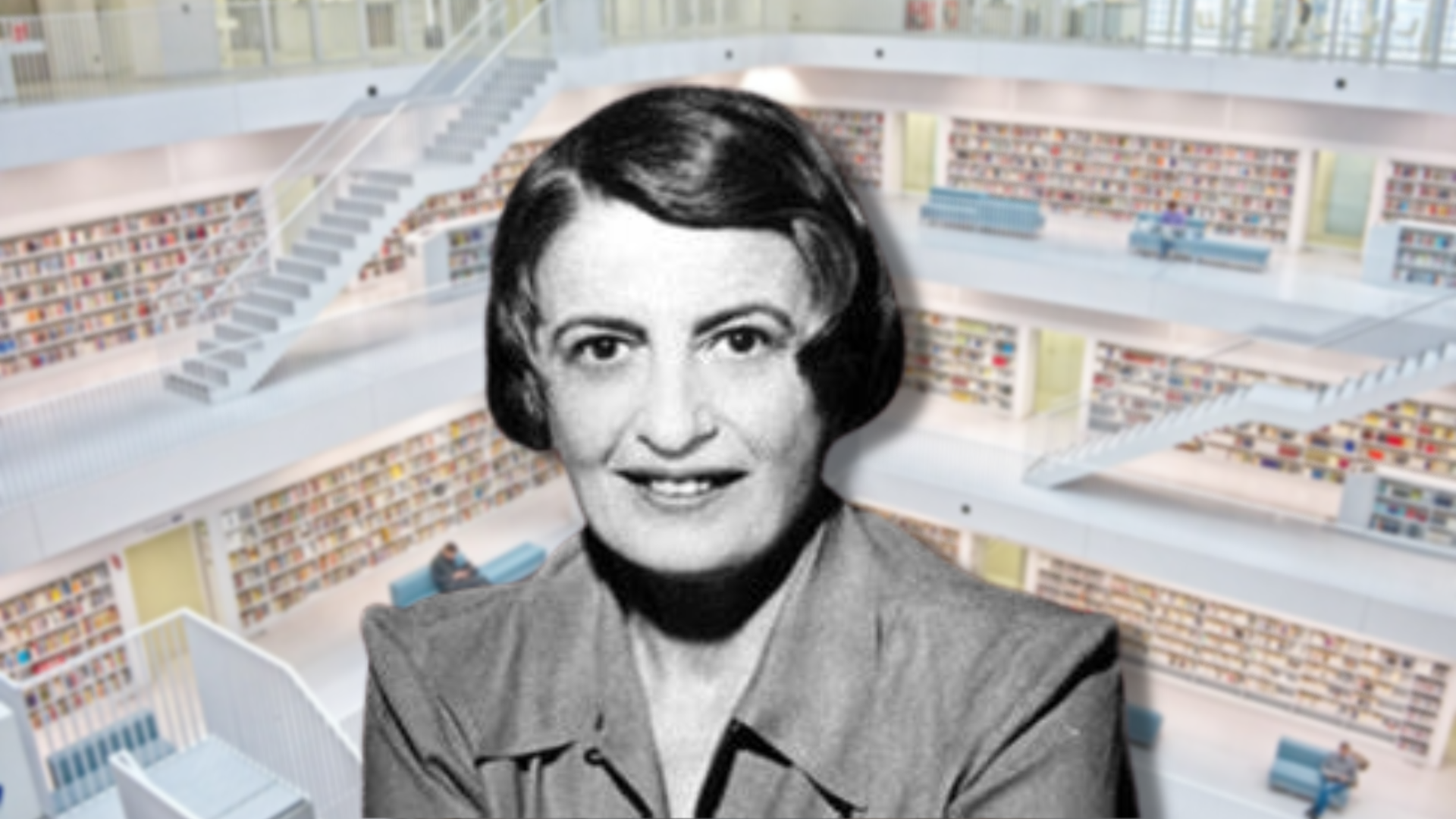
About the Author:
Alice O'Connor, better known by her pen name Ayn Rand, was a Russian-American writer and philosopher. She is known for her fiction and for developing a philosophical system she named Objectivism.
Born and educated in Russia, Rand moved to the United States in 1926. After two early novels that were initially unsuccessful and two Broadway plays, she achieved fame with her 1943 novel, The Fountainhead.
In 1957, Rand published her best-selling work, the novel Atlas Shrugged. Afterward, until her death in 1982, she turned to non-fiction to promote her philosophy, publishing her own periodicals and releasing several collections of essays. The Fountainhead has sold more than 9,000,000 and continues to be extremely influential in the culture to this day.
Additional Resources:
Ayn Rand Biography | Wikipedia
Ayn Rand: Why Is She So Popular? | BBC
The Mike Wallace Interview with Ayn Rand
This Book on Amazon:
If You Liked This Book:
Ayn Rand Nation, by Gary Weiss
The Creative Act, by Rick Rubin
Napoleon: A Life, by Andrew Roberts
Excellent Sheep, by William Deresiewicz
The Great Rat Race Escape, by M.J. DeMarco
Finite and Infinite Games, by James P. Carse

